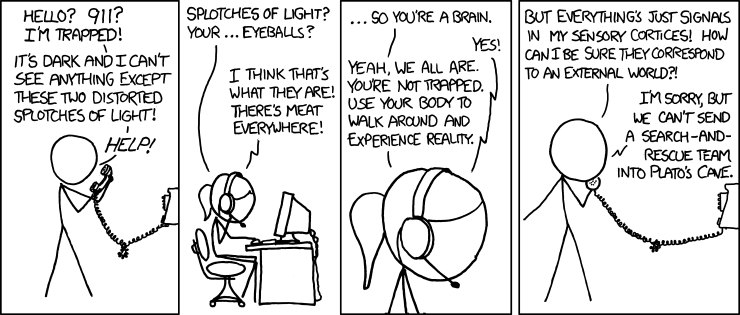Plato's Cave
Last post I discussed the concept of axiomatic systems, without laying down any concrete foundations of building one. One might be tempted to think that such system is unnecessary, surely you can know for example whether your shoes are untied by looking down at your shoes, no axioms needed. But do take a moment to think of times where sensory data does not match the territory.
When dreaming for example, we experience sensations that do not correspond to reality. Similarly, several medical conditions can cause hallucinations, which are sensory data in the absence of external stimuli. When sick our taste and smell often feel off. You might think that all those conditions are necessarily temporary, and when they are over are sensations correspond again to the real world, but have you ever had a dream that felt so real you couldn't tell it from reality? Did you ever wake up from a dream just to realize you are still dreaming? How can you tell you are not dreaming right now? How can you tell you are not some brain in a jar whose nervous system is connected to a machine supplying false sensory data to the brain?
Even when your senses are working as expected, the data registered in our consciousness is not the raw data from our senses. Many experiments have shown that it's rather easy to trick our brains into registering false data. For example optical illusions and auditory illusions can cause us to perceive objects differently from reality. Take a look at this image, if you are not already familiar with it, you might be surprised to learn that both arrows are of the same length, but if are familiar with it, you might still be surprised to realize that, despite knowing that both arrows are of the same length, your brain still insists that lower one is shorter!
That's not all, what we do perceive is but a tiny fraction of the reality around us, when our senses are not outright "lying" to us, they do "lie" by omission. Our human eyes can only register a sub range of all the electromagnetic spectrum, and the cone cells in our retina project the practically infinite wave lengths, into merely three dimensions: red, green and blue. Similarly our ears can only perceive a small fraction of audio waves, and our human sense of smell is a joke among the animal kingdom.

Imagine prisoners shackled in a cave, there's a light source behind them, and their heads fixed in such a way that they can only perceive the shadows certain objects cast upon the wall of in front of them. The prisoners were shackled from birth, so they have never perceived anything other than the mere shadows of such objects. From the perspective of the prisoners there is nothing else out there, the entire existence is two-dimensional silhouettes on a wall. If one of the prisoners happen to ever free himself and step out of the cave, he will have no framework, no words, in which to describe what he now experiences.
This allegory was first introduced by Plato to illustrate that one cannot tell the boundaries of his own experiences, we cannot perceive that which we cannot perceive. Like the prisoners in the cave, we ourselves can only perceive a mere fraction of reality, and even understanding on an intellectual level that there are things all around us that we cannot perceive, is a world apart from understanding what they are.
All this is to say, that our senses are not enough to assert what is true and what is not.

